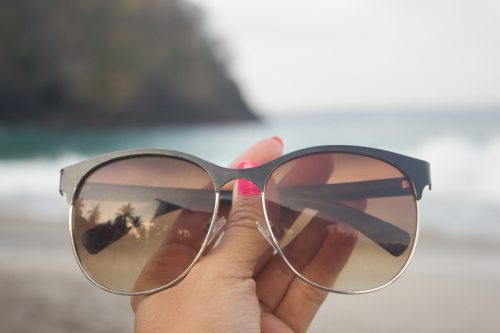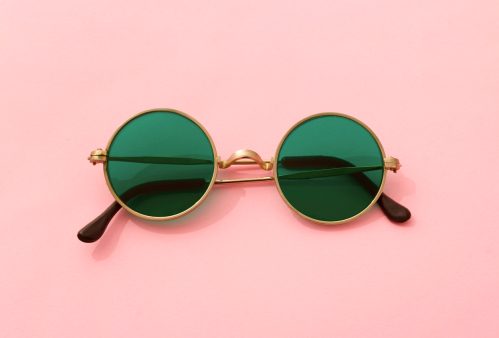The 5 Best Sunglasses for Your Eyes, Doctors Say

You probably buy sunglasses, foremost, to shield your eyes from the sun, and secondly, to look stylish while doing so. But not all shades are created equal. In fact, the color of sunglass lenses can greatly affect your vision.
Surprisingly, the tint of your sunglass lenses has nothing to do with protection from harmful UV rays since sunglasses’ protective UV coating is actually clear. When looking for the best protection from UV rays, you want to find glasses with a rating of UV400.
But the lens color is important for reducing glare, improving color perception, and enhancing contrast, advises Bhavin Shah, a behavioral and neurodevelopmental optometrist. Keep reading to hear from Shah and other eye experts about which sunglass lens colors are best for your lifestyle.
READ THIS NEXT: 6 Expert Tips on Getting Sun Without Aging Yourself.
The 5 Best Sunglass Lens Colors
1. Gray lenses reduce glare.

Gray lenses tend to be the best choice for general activities like driving since this tint reduces glare, doesn’t distort colors, and is comfortable for most people—these factors are also why they work in all different types of weather.
But since the darker the tint of the lens, the more light is blocked, gray is not the best choice for dim light conditions, advises Shane Kannarr, OD, medical reviewer for All About Vision.
2. Brown or amber lenses are best for outdoor activities.

Brown or amber lenses help reduce glare on very sunny and bright days, which is why many people use them for outdoor sports like hiking and golfing, as well as driving.
For example, while golfing, this color sunglass lens will “help highlight the ball against the grass in regular light levels by enhancing the contrast,” explains Shah.
Polarized brown or amber lenses—those which have a special chemical applied to them to filter light, according to the American Academy of Ophthalmology (AAO)—are also the best for water activities, says Eyebuydirect. “These tints help make everything seem more vibrant and brighter, and the polarization makes it possible to see past the reflections coming off the water,” they explain.
READ THIS NEXT: If You Notice This Around Your Eyes, Get Your Liver Checked.
3. Green lenses can reduce eye strain.

Some people claim they have less eye strain when wearing green lenses, as this color filters some blue light.
Since green lenses provide good glare protection, can perceive color well, and work well in more light levels compared to brown or amber lenses, this color shade tends to be best for medium-bright conditions, Shah explains.
4. Yellow or orange lenses work well in dim lighting.

Yellow or orange lenses can help enhance contrast in lower light levels since this color allows a lot of light through the lens. This is why some people like to wear these lenses when driving in lower light conditions like during twilight or in the fog, explains Shah.
Kannarr adds that they’re an ideal lens for indoor sports with a smaller ball like racquetball, since they provide the greatest contrast in low-light conditions.
For more style advice delivered straight to your inbox, sign up for our daily newsletter.
5. Red or rose-colored lenses help in bright white conditions.

Similar to yellow or orange lenses, red- or rose-colored shades “greatly alter color accuracy, but improve contrast,” which makes them the ideal lens for snow sports or any activity where color accuracy doesn’t matter,” explains Kannarr.
However, this is the same reason you don’t want to wear these lenses for driving, warns Kannarr.
Red or pink lenses are also a good choice for blocking blue light from screens because they can reduce glare in medium brightness…and are not as dark as gray lenses, advises Shah.
Best Life offers the most up-to-date information from top experts, new research, and health agencies, but our content is not meant to be a substitute for professional guidance. If you have health questions or concerns, always consult your healthcare provider directly.